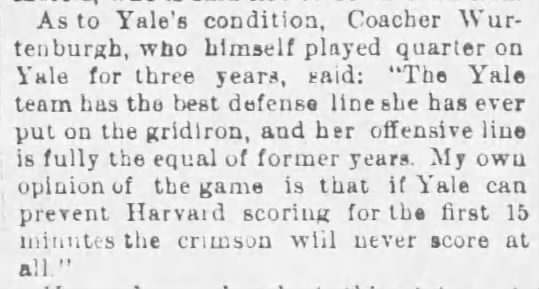Terminology... Football Coach, Offensive Line, and Offensive Line Coach
This is article #8 in a series covering the origins of football’s terminology. All are available under the Terminology tab above. My book, Hut! Hut! Hike! describes the emergence of more than 400 football terms.
The game we call football evolved from rugby in the 1870s and 1880s. Initially, the players on the front wall of the offense were called forwards, while those on defense were rushers. The forwards were referred to as the offensive line for the first time in 1893. Appropriately, that reference came in an article about Iowa preparing for their Thanksgiving game with Nebraska.
Less than a week later, offensive line saw its second use in an article about the upcoming Harvard-Yale game. A clipping from that article is below and includes a reference to Yale’s coacher, a form of coach used early on after Americans imported the term from England.
Football coach first appeared in an American newspaper in 1889, one year after "baseball coach" made its premiere. As in America, the British used "coach" to describe horse-drawn vehicles that carried people from one place to another. University of Oxford students in the 1830s began using "coach" as slang for a tutor that carried a student through his classes. The term transferred over to sports instructors and then crossed the water.
To bring this all together, the term for the most important coaching position in the game did not arrive until 1925. As reported at the time, former Notre Dame tackle Joe Dunn, after winning a national championship his senior season, arrived in Atlanta that March to interview for the position as offensive line coach at Georgia Tech. Apparently, he did not get or take the job since Tech hired an alum as line coach instead.
Other noble men gained the title of offensive line coach over the years, but Joe Bach will always be the first. Almost.
Football Archaeology is reader-supported. Click here to buy one of my books or otherwise support the site.



